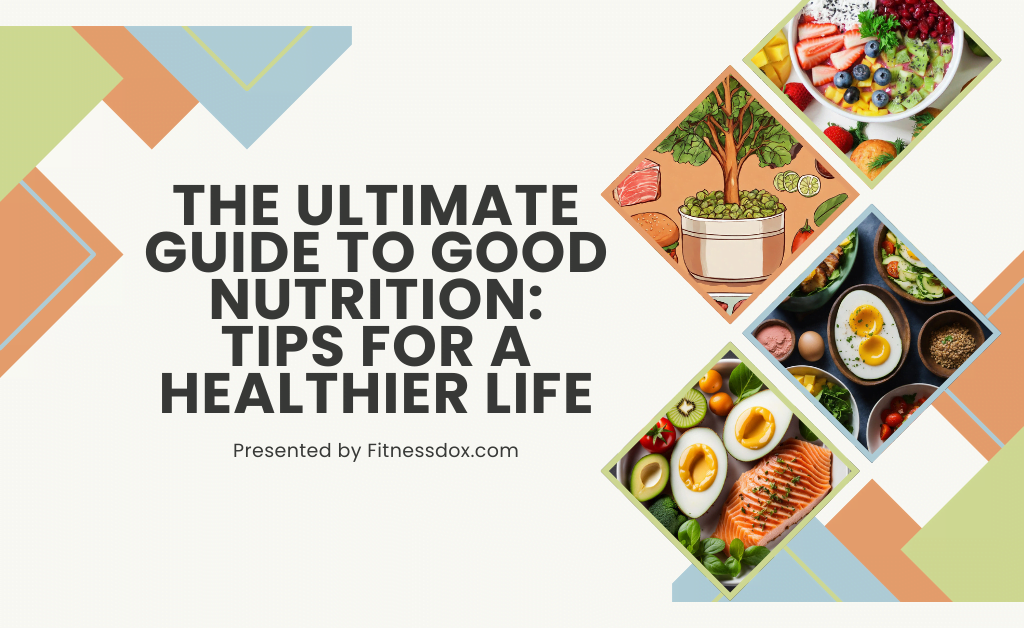Introduction
Did you know that what you eat significantly impacts your overall health, mood, and energy levels? Good nutrition isn’t just about losing weight or looking good; it’s the cornerstone of a fulfilling life. This comprehensive guide will delve into the world of good nutrition, providing you with essential knowledge to make informed choices and nourish your body optimally.
Let’s embark on a journey to understand the basics of nutrition, create a sustainable eating plan, and explore the nuances of dietary needs for different populations. By the end of this guide, you’ll be empowered to make conscious food decisions that contribute to a healthier and happier you.
Understanding the Basics of Nutrition
Nutrition is the science of how your body utilizes food for growth, repair, and energy. It encompasses the intake, absorption, and utilization of nutrients from food. To grasp the essence of good nutrition, we must understand the building blocks of our diet: macronutrients and micronutrients.
Macronutrients are the energy-providing components that our bodies need in large quantities. They include:
- Carbohydrates: The body’s primary energy source, found in grains, fruits, vegetables, and dairy.
- Proteins: Essential for building and repairing tissues, found in meat, poultry, fish, eggs, beans, and soy.
- Fats: Provide energy, insulate the body, and aid in vitamin absorption. Healthy fats are found in avocados, nuts, seeds, and olive oil.
Micronutrients are vitamins and minerals required in smaller amounts but are equally vital for optimal health. They support various bodily functions, from immune system strength to bone health.
Achieving a balanced diet is key to good nutrition. It involves consuming a variety of foods from all food groups in appropriate portions. The concept of the food pyramid or plate model visually represents this balance, emphasizing the importance of fruits, vegetables, whole grains, lean proteins, and low-fat dairy.
Building a Healthy Eating Plan
Transitioning to a healthier diet involves setting achievable goals and making gradual changes. Instead of drastic overhauls, focus on incorporating wholesome foods into your daily routine.
Meal planning and preparation can be game-changers. By planning your meals in advance, you’re more likely to make healthier choices and avoid impulsive eating. Cooking at home allows you to control ingredients and portion sizes. Don’t forget the power of healthy snacks like fruits, vegetables, nuts, or yogurt to keep hunger at bay.
Hydration is often overlooked but crucial. Water is essential for various bodily functions, including digestion, temperature regulation, and nutrient transportation. Aim for at least eight glasses of water daily, and consider incorporating hydrating beverages like herbal tea or infused water.

Essential Nutrients and Their Sources
Let’s delve deeper into specific nutrients and their dietary sources.
Proteins are the building blocks of our bodies. Complete proteins, found in animal sources, contain all essential amino acids. Incomplete proteins, from plant sources, need to be combined to provide all essential amino acids. Good protein sources include lean meats, poultry, fish, eggs, beans, lentils, tofu, and quinoa.
Carbohydrates are our primary energy source. Complex carbohydrates, found in whole grains, fruits, and vegetables, provide sustained energy and fiber. Simple carbohydrates, present in refined sugars and processed foods, should be consumed in moderation. Fiber, a type of carbohydrate, promotes gut health and aids digestion.
Fats are essential for various bodily functions, but the type of fat matters. Unsaturated fats, found in avocados, nuts, seeds, and olive oil, are heart-healthy. Trans fats and saturated fats should be limited. Omega-3 fatty acids, found in fatty fish, flaxseeds, and chia seeds, support brain and heart health.
Vitamins and minerals are micronutrients vital for overall well-being. Vitamin C boosts immunity, vitamin D supports bone health, and iron aids in oxygen transport. Calcium strengthens bones, and potassium regulates blood pressure. Fruits, vegetables, whole grains, lean proteins, and dairy products are excellent sources of various vitamins and minerals.
Special Dietary Needs and Considerations
Certain individuals may require specific dietary adjustments due to allergies, intolerances, or lifestyle choices.
Vegetarian and vegan diets can be healthy and nutritious with proper planning. Plant-based protein sources, fortified plant-based milk, and vitamin B12 supplements are essential.
Food allergies and intolerances can significantly impact dietary choices. Common allergies include milk, eggs, peanuts, tree nuts, wheat, soy, fish, and shellfish. Intolerances, like lactose intolerance, can cause digestive discomfort. Consulting a healthcare professional or registered dietitian can help manage these conditions.
Weight management involves a combination of diet and exercise. A balanced diet with portion control is crucial for sustainable weight loss or gain. Focus on whole foods, and avoid restrictive diets or fad trends.
Nutrition for Specific Populations
Nutritional needs vary based on age, gender, and lifestyle.
Children and adolescents require nutrient-dense foods for growth and development. Encourage a variety of fruits, vegetables, whole grains, lean proteins, and low-fat dairy. Limit sugary drinks and processed foods.
Pregnancy and breastfeeding increase nutritional demands. Adequate protein, calcium, iron, and folic acid are essential. Consult with a healthcare provider for personalized guidance.

Older adults may experience changes in appetite, taste, and digestion. Maintaining a balanced diet, staying hydrated, and considering supplements as recommended by a healthcare professional are important.
Athletes require increased energy and nutrient intake to support performance. Carbohydrates provide fuel, proteins aid in muscle repair, and adequate hydration is crucial.
Common Nutrition Myths and Misconceptions
Numerous nutrition myths circulate, leading to confusion and misinformation. Let’s debunk some common ones:
- Myth: Skipping meals boosts weight loss.
- Fact: Regular meals help maintain blood sugar levels and prevent overeating.
- Myth: All carbohydrates are bad.
- Fact: Complex carbohydrates from whole grains, fruits, and vegetables are essential for health.
- Myth: Low-fat or fat-free means healthy.
- Fact: Focus on the type of fat, not just the amount.
Conclusion
Embarking on a journey towards good nutrition is a rewarding investment in your overall well-being. By understanding the basics, creating a balanced eating plan, and addressing specific dietary needs, you can nourish your body and optimize your health. Remember, sustainable changes are key. Incorporate wholesome foods, stay hydrated, and listen to your body’s cues.
Share your nutrition goals and challenges in the comments below. Let’s inspire and support each other on this path to a healthier life!



Pingback: How to Create a Balanced Diet and Nutrition Plan 10 Tips